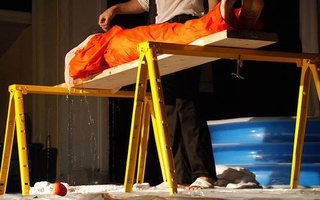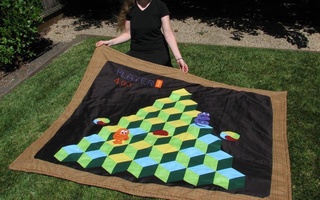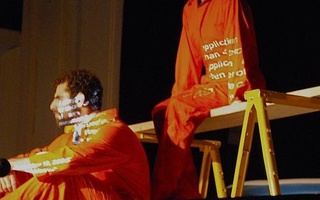THC: As someone who studies stage violence, how do you view something like WWF, particularly in the context of contemporary culture?
AT: Well, there seems to be an attempt to curb violence in our culture, although were still a gun-toting country. And this is an outlet for violence that is safe and legal and a way to enjoy violence in a public arena, something we can't normally do since we don't have staged executions yet (though I imagine someday we will on TV).
This is one way to sanction the desire to look and to see violence and to see people hurt. And also, it has this strange soap opera edge to it. So it seems to appeal across different lines in society. There's a narrative element to it, not just violence.
THC: Do you see it as a conservative force, socially speaking?
AT: I think it can be seen both ways: as very conservative and also as a subversive element in society. The idea seems to be that you go home and practice these moves on your little brother. So in a way it shows you how to unleash this real anger that you have inside of you when your brother says something nasty to you--now youve got this move, a body-slam or something. In some ways it sanctions that sort of violence, but in other ways it's an attempt to focus your energy into being the spectator instead of the participant.
THC: If we can go back to the Restoration for a second, at what point did stage depictions or torture actually stop?
Read more in Arts
Life on the High-WireRecommended Articles
-
 A Tortured Affair
A Tortured Affair -
 New Courses, New You
New Courses, New You -
 A Tortured Affair
A Tortured Affair -
Atul Gawande Criticizes Supermax PrisonsSupermax prisons, which are designed to hold prisoners in prolonged and strict solitary confinement, are ineffective, expensive, and detrimental to mental health, surgeon and journalist Atul Gawande said during a speech at Harvard Law School yesterday.
-
Change We Can Believe In?Some people ask whether terrorists should have rights. But there is no way to tell who is a terrorist and who isn’t without some sort of fair process.
-
POSTCARD: In the Heart of DarknessIt is impossible to describe the feeling of listening to someone praise a man who was responsible for the torture and death of thousands of Chilean citizens during his brutal 17-year regime.













